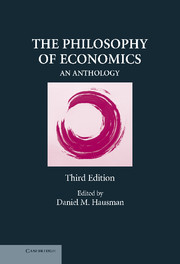Book contents
- Frontmatter
- Contents
- Introduction
- PART ONE CLASSIC DISCUSSIONS
- PART TWO POSITIVIST AND POPPERIAN VIEWS
- PART THREE IDEOLOGY AND NORMATIVE ECONOMICS
- 11 Science and Ideology
- 12 Welfare Propositions of Economics and Interpersonal Comparisons of Utility
- 13 The Philosophical Foundations of Mainstream Normative Economics
- 14 Why Is Cost-Benefit Analysis So Controversial?
- 15 Capability and Well-Being
- PART FOUR BRANCHES AND SCHOOLS OF ECONOMICS AND THEIR METHODOLOGICAL PROBLEMS
- PART FIVE NEW DIRECTIONS IN ECONOMIC METHODOLOGY
- Selected Bibliography of Books on Economic Methodology
- Index
12 - Welfare Propositions of Economics and Interpersonal Comparisons of Utility
Published online by Cambridge University Press: 05 June 2012
- Frontmatter
- Contents
- Introduction
- PART ONE CLASSIC DISCUSSIONS
- PART TWO POSITIVIST AND POPPERIAN VIEWS
- PART THREE IDEOLOGY AND NORMATIVE ECONOMICS
- 11 Science and Ideology
- 12 Welfare Propositions of Economics and Interpersonal Comparisons of Utility
- 13 The Philosophical Foundations of Mainstream Normative Economics
- 14 Why Is Cost-Benefit Analysis So Controversial?
- 15 Capability and Well-Being
- PART FOUR BRANCHES AND SCHOOLS OF ECONOMICS AND THEIR METHODOLOGICAL PROBLEMS
- PART FIVE NEW DIRECTIONS IN ECONOMIC METHODOLOGY
- Selected Bibliography of Books on Economic Methodology
- Index
Summary
Nicholas Kaldor (1908–1986) was born in Budapest and educated in Budapest, Berlin, and at the London School of Economics. In addition to an academic career, which was centered at Cambridge University, Kaldor served as an advisor to several governments and was instrumental in devising the value added tax (VAT). In this brief essay, originally published in 1939, he argues that the net benefit of a policy – the amount that “winners” would be willing to pay minus the amount that “losers” would need to be compensated – provides a measure of the capacity of an economy to satisfy preferences that does not require interpersonal comparisons or any judgment concerning the justice of different distributions. In a separate essay published in the same year, John Hicks defends the same idea, and assessment of alternatives in terms of net benefits is often called “the Kaldor-Hicks efficiency criterion.”
In the December 1938 issue of the Economic Journal Professor Robbins returns to the question of the status of interpersonal comparisons of utility. It is not the purpose of this note to question Professor Robbins' view regarding the scientific status of such comparisons; with this the present writer is in entire agreement. Its purpose is rather to examine the relevance of this whole question to what is commonly called “welfare economics.” In previous discussions of this problem it has been rather too readily assumed, on both sides, that the scientific justification of such comparisons determines whether “economics as a science can say anything by way of prescription.”
- Type
- Chapter
- Information
- The Philosophy of EconomicsAn Anthology, pp. 222 - 225Publisher: Cambridge University PressPrint publication year: 2007



